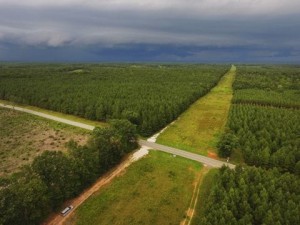From an Article by Gregory S. Schneider, Washington Post, August 28, 2018
Photo: The Transco Pipeline cuts through the forests of Buckingham County and crosses Route 56 in the foreground. The Atlantic Coast Pipeline would pass through Buckingham County and connect to this pipeline. A compressor station would be built at this intersection.
RICHMOND — An advisory board appointed by the governor has recommended that the state rescind permits for two natural-gas-pipeline projects, putting its members at odds with Gov. Ralph Northam (D), who maintains that the regulatory process is working as it should.
The 15-member Advisory Council on Environmental Justice on Tuesday formally urged Northam to direct state agencies to suspend water and air quality permits for the Atlantic Coast Pipeline and the Mountain Valley Pipeline, separate projects being built through mountainous and rural parts of the state.
[The Baptists and the yogis join to fight a pipeline]
Raising questions about the impact on health and the environment from the pipelines, the council said the governor should appoint an emergency task force “to ensure that predominately poor, indigenous, brown and/or black communities do not bear an unequal burden of environmental pollutants and life-altering disruptions.”
The board, created in October by Gov. Terry McAuliffe (D), has no authority over the process but is charged with providing “independent advice and recommendations to the Executive Branch” on matters of environmental justice, according to Executive Order 73, which established it.
Its members include faculty from several state universities, a representative of state Indian tribes and people from several environmental and social justice groups, such as the Virginia Poverty Law Center, Virginia Interfaith Power and Light, and the Natural Resources Defense Council. All 15 council members were appointed by McAuliffe.
The council has met in recent weeks with the community of Union Hill in Buckingham County, a historically African American area that is the planned site of a compressor station for the Atlantic Coast Pipeline.
That project will carry natural gas 600 miles from West Virginia through the central part of Virginia and into North Carolina. It’s being built by a consortium of companies led by Dominion Energy.
The Union Hill compressor station faces a key state air-quality permit hearing on September 11th, and the advisory council recommended that Northam suspend that process to give it deeper review.
A spokesman for the Atlantic Coast Pipeline said Dominion has gone to great lengths to accommodate the concerns of Union Hill residents. “We strongly disagree with the Advisory Council’s recommendations,” Aaron Ruby said via email.
Northam casts himself as an environmentalist, but he has drawn criticism from other Democrats for failing to oppose the pipeline projects. He has countered that he is satisfied that state agencies are conducting a thorough review of the projects.
The governor “was instrumental in the advisory council’s formation precisely because he values [its] feedback,” Northam spokeswoman Ofirah Yheskel said via email. “The Governor and his staff will review the letter carefully and respond to the Council.”
Work on both pipelines is suspended in Virginia after federal judges found that federal agencies had issued several permits without adequate scrutiny.
The Mountain Valley Pipeline, a 300-mile project being built by a coalition of companies led by EQT Midstream Partners of Pittsburgh, is farther along because it had secured erosion and sediment control permits from the state. Those permits for the Atlantic Coast Pipeline are still under review.
[Virginia regulators consider revoking pipeline permits, but settle for stricter review]
Last week, the State Water Control Board debated suspending permits for both pipelines and subjecting them to a more detailed analysis of each place where the projects cross a stream or river, but it ultimately pulled back in a 4-to-3 vote. Instead, the board urged state regulators to apply the strictest oversight possible.

